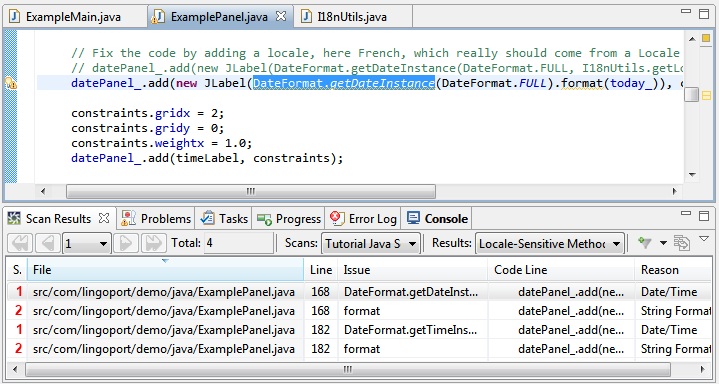Fixing Locale-Sensitive Methods
In this section, you will fix another kind of issue detected
by the scanner: Locale-Sensitive Methods (also referred to as
Unsafe Methods in previous version of Globalyzer).
Locale-Sensitive Methods are methods or functions that return
locale-specific results. For example, methods that format dates and
currency information must be written to take the user's locale into
consideration. Within C and C++, functions and methods often
iterate through an array of characters, assuming a single byte per
character or assuming ASCII values. In international environments,
the Unicode character encoding is often required and Unicode
characters, except in the case of UTF-8, are always more than a
single byte. To properly fix a locale-sensitive method, you
typically need to do one of the following:
- replace a locale-sensitive method with another method that
is safe for the targeted locales and character encodings
- modify the method call to include locale information, such
as a Locale object in Java
Clearly, the procedure you follow in your own projects will
depend on your particular system architecture, including the
language you are using, how locale information is stored and
retrieved, and so on.
Note: an online video guide is available for this section
of the tutorial. To see this video, as well as other Globalyzer
video tutorials, click
here. The video guide relevant to this tutorial is
titled Part Five: Externalizing String and Pseudo-Localization.
- Select Locale-Sensitive Methods in the Results
dropdown within the Scan Results window.
- There are six issues. Four formatting issues, and two issue for setLocale: in this tutorial, you are going to
ignore the
setLocale methods. You should follow the
same procedure as for ignoring a String, which you did in a
previous section. (Hint: right click the issue and select Ignore
this Line for a permanent result)
-
Before fixing the date/time formatting issues, let's look at the
All Predicted Scan Summary that was generated when you scanned
the code. It can be found in the lower left of the window.

-
In the Summary view, scroll down to the Locale-Sensitive
Methods section. You will find links to a date and a time
method, both under the Date/Time category. Click each link
to view more detailed information about the issues.

Tip: Use the All Predicted Scan Summary view to find
detailed information on locale-sensitive methods. Just click on a
detected method link and Globalyzer will display the associated
help page. This information can be useful in assisting you to
re-code or replace the method call.
-
In the Scan Results table, double-click the row containing
the locale-sensitive method with
DateFormat.getTimeInstance(...).
This opens the associated source file and highlights the method
call in the Editor view.

The reason this line represents a potential error is that the
getTimeInstance
method actually has several overloaded signatures. In this case,
the method takes no parameters and uses the system's default
locale to format the time.
-
In the Editor view, revise the
getDateInstance
method as follows:
datePanel_.add(new
JLabel(DateFormat.getDateInstance(DateFormat.FULL,
I18nUtils.getLocale()).format(today_)), constraints); //
$NON-NLS-L$
In this case, the locale is retrieved with the
I18nUtils.getLocale
method, which is responsible for getting whatever locale was
maintained for the application (here French from France). Please
note the
DateFormat.FULL
parameter, which simply formats the date string as follows (for a
US/English locale): Monday, May 17, 2012
-
The tag added at the end of the line,
// $NON-NLS-L$
, lets Globalyzer know to ignore this line for the next scan. The
software engineer who corrected the line now considers it is not
an i18n issue any longer. There is another method to remove the
locale-sensitive method from the Scan Results table:
change its Prediction to F by right-clicking on the row
and selecting Mark Prediction: False. If you are using
the Scan View All Predicted Active, issues with F predictions
will not be displayed in the Scan Results.
-
Note that the call to DateFormat.getDateInstance (as well
as DateFormat.getTimeInstance) creates a DateFormatter object,
based on a locale (default or passed in). This particular call to
the format method applies the DateFormat using that initial
locale. Hence the format call is not i18n issues in this
particular lines of code.
-
Make similar changes for the second Locale-Sensitive Method
error, changing the code to the following:
datePanel_.add(new
JLabel(DateFormat.getTimeInstance(DateFormat.DEFAULT,
I18nUtils.getLocale()).format(time_)), constraints); //
$NON-NLS-L$
-
Save the source file by selecting File=>Save or by
typing Ctrl-S.
You have now fixed two locale-sensitive methods by locating them
using the Scan Results table and directly editing the source
files. Previously, you used the Scan Results table to locate
embedded strings and fixed them by using Globalyzer's String
Externalization feature. The final step is to test your code
changes.

 
|






